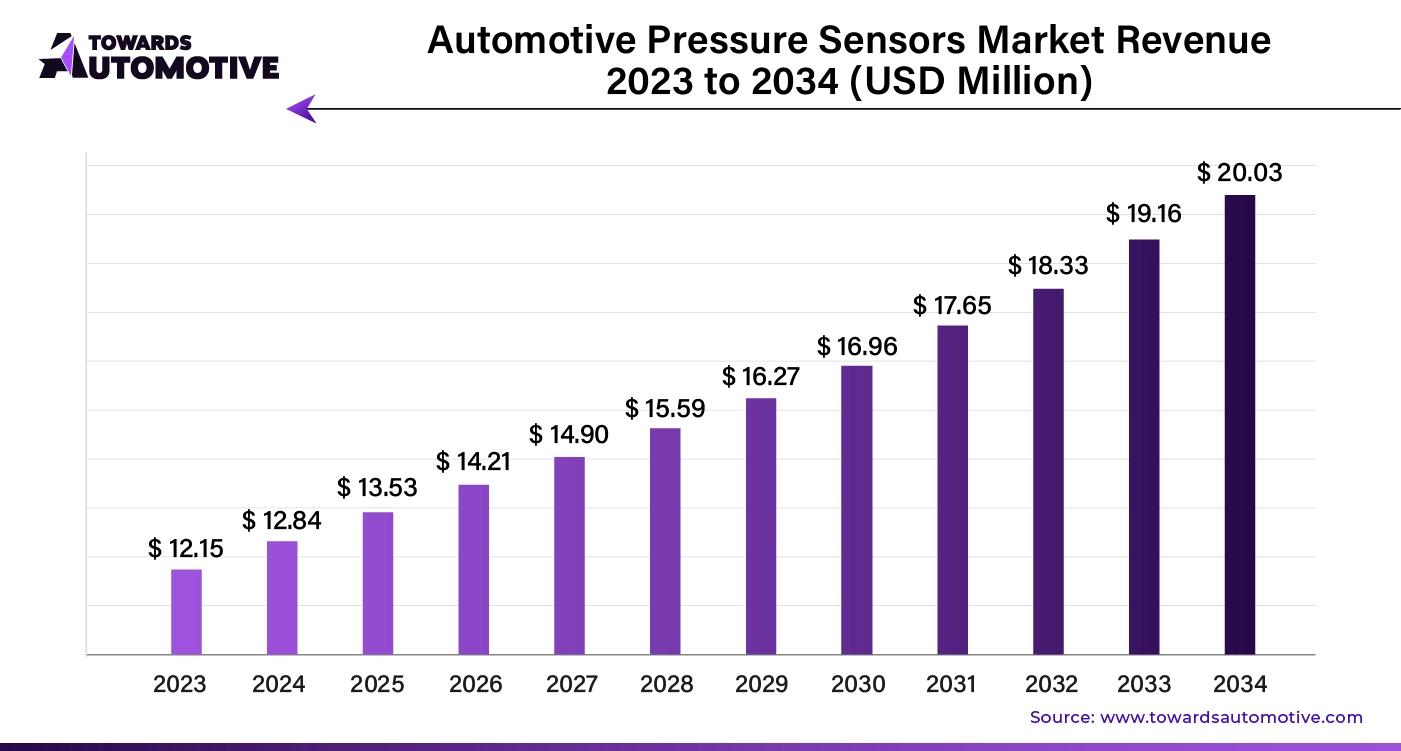The global automotive pressure sensor market is on a strong growth trajectory. Valued at USD 12.84 billion in 2024, it is expected to reach USD 20.03 billion by 2034, expanding at a compound annual growth rate (CAGR) of 4.67% from 2024 to 2034. This robust growth is fueled by the increasing demand for advanced safety, emission control systems, and technological innovations in the automotive sector. Pressure sensors play a critical role in ensuring the efficient functioning of various systems, including tire pressure monitoring systems (TPMS), engine control, fuel systems, and braking systems. As automotive manufacturers prioritize safety and sustainability, the automotive pressure sensor market has emerged as a key area of expansion.

Get All the Details in Our Solution – Download Brochure @ https://www.towardsautomotive.com/download-brochure/1083
Key Market Insights
- Asia Pacific dominated the global automotive pressure sensors market, maintaining its strong position in the industry.
- North America is expected to experience significant growth, with a noteworthy compound annual growth rate (CAGR) during the forecast period.
- By sensor type, the position sensor segment holds the largest share of the market, reflecting its crucial role in monitoring and regulating key automotive components.
- In terms of vehicle type, the passenger car segment is leading the industry, driven by rising consumer demand for fuel-efficient, safe, and technologically advanced vehicles.
Introduction to Automotive Pressure Sensors
Automotive pressure sensors have become essential components in modern vehicles due to their ability to monitor and regulate critical automotive systems. These sensors are integral to tire pressure monitoring systems, fuel systems, engine control, and braking systems. They also play an important role in ensuring that vehicles meet stringent emission regulations across the globe. With stricter emission standards in place, automotive manufacturers are increasingly turning to pressure sensors to optimize fuel combustion and reduce vehicle emissions, thereby adhering to environmental guidelines.
In addition, the rapid adoption of electric vehicles (EVs) has further boosted the demand for pressure sensors. These sensors are crucial for managing the battery, cooling systems, and energy efficiency in EVs, ensuring that they perform at their highest capabilities. Furthermore, the integration of advanced driver assistance systems (ADAS) and the move toward autonomous vehicles are driving the demand for more advanced pressure sensors. These sensors are vital for the real-time monitoring of vehicle components, contributing to enhanced safety and vehicle control.
As consumers increasingly demand vehicles with higher performance, better fuel efficiency, and superior safety features, automakers are incorporating advanced pressure sensor technologies across a broader range of vehicle segments. Innovations in sensor technology, including miniaturization and improved accuracy, are making pressure sensors more reliable and expanding their applications in the automotive industry.
The Role of AI in the Automotive Pressure Sensors Market
Artificial Intelligence (AI) is revolutionizing the automotive pressure sensors market by improving the accuracy, efficiency, and overall functionality of sensor systems. By integrating AI algorithms and machine learning techniques, pressure sensors can now analyze data more precisely and make real-time decisions that enhance vehicle performance, safety, and fuel efficiency. This is particularly beneficial in advanced applications such as engine management, tire pressure monitoring, and brake control.
AI’s integration into pressure sensor systems allows for predictive maintenance and fault detection. Through continuous monitoring of sensor data, AI can detect patterns that may indicate potential issues or failures, enabling proactive maintenance before problems escalate. This capability helps reduce vehicle downtime, extend the vehicle’s lifespan, and improve overall reliability. As a result, vehicles become more efficient, and consumers benefit from enhanced reliability and performance.
In the context of autonomous driving and ADAS, AI-powered pressure sensors are becoming increasingly essential. These sensors help manage the complex data generated by various vehicle systems and respond in real-time to pressure changes. This contributes to improved vehicle control, stability, and overall safety, ensuring that the vehicle can make accurate adjustments to pressure conditions while navigating diverse driving environments.
The integration of AI in the automotive pressure sensors market is also boosting the development of electric vehicles (EVs), optimizing aspects such as battery management, energy usage, and thermal regulation. With the help of AI, pressure sensors can better manage the various challenges EVs face, ensuring they operate efficiently and safely.
The Growing Demand for TPMS
Tire Pressure Monitoring Systems (TPMS) are a major driver of the growth in the automotive pressure sensors market. TPMS monitor the air pressure within a vehicle’s tires and alert drivers when tire pressure falls below the recommended level. This is a crucial safety feature, as underinflated tires can lead to reduced fuel efficiency, increased tire wear, and a higher risk of accidents due to poor handling or tire blowouts.
Government regulations have significantly fueled the adoption of TPMS, as regulatory bodies worldwide have implemented laws requiring the installation of TPMS in all new vehicles. For instance, the U.S. has mandated TPMS in all light vehicles since 2007 under the TREAD Act. These regulations have been instrumental in driving the demand for automotive pressure sensors, as they are the core components of TPMS.
Consumer awareness of vehicle safety and fuel efficiency is also propelling the widespread adoption of TPMS. As more automakers integrate TPMS in their models to meet safety standards and consumer expectations, the demand for pressure sensors continues to rise.
In September 2024, Goodyear launched Goodyear TPMS Connect, a software solution that integrates with TPMS hardware to monitor tire pressure in real-time. Such innovations further enhance the functionality of TPMS and contribute to market growth.
Invest in Our Premium Strategic Solution @ https://www.towardsautomotive.com/price/1083
You can place an order or ask any questions, please feel free to contact us at sales@towardsautomotive.com
Explore the comprehensive statistics and insights on automotive industry data and its associated segmentation: Get a Subscription
For Latest Update Follow Us: https://www.linkedin.com/company/towards-automotive
